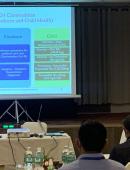
The USAID Global Health Supply Chain Program-Procurement and Supply Management (GHSC-PSM) project strives to impact global maternal, newborn and child health (MNCH) outcomes by providing support to governments and partners to improve supply chains and deliver medicines and supplies that treat and prevent:
- Postpartum hemorrhage (PPH)
- Pre-eclampsia and eclampsia
- Birth asphyxia
- Diarrhea, pneumonia, and Possible Severe Bacterial Infections (PSBI)
- Transmission of the Zika virus
Check out the GHSC-PSM MNCH overview fact sheet and webpage to learn how and where the project is carrying out USAID’s priorities for improved maternal, newborn and child health outcomes.
GHSC-PSM’s activities to support mothers, newborns and children target the following outcomes:
 In some contexts, GHSC-PSM facilitates the delivery of products on behalf of other partners including cholera commodities in Haiti and the coordination of a transfer of a large stock of oxytocin between the governments of Madagascar and Malawi.
In some contexts, GHSC-PSM facilitates the delivery of products on behalf of other partners including cholera commodities in Haiti and the coordination of a transfer of a large stock of oxytocin between the governments of Madagascar and Malawi.
 By supporting national governments to improve their logistics management information systems, data collection processes, and data collector and analyst training, countries like Malawi have greater visibility on the stock levels of MNCH commodities in the supply chain.
By supporting national governments to improve their logistics management information systems, data collection processes, and data collector and analyst training, countries like Malawi have greater visibility on the stock levels of MNCH commodities in the supply chain.
With improved data, GHSC-PSM implements a modernized solution for country-led quantification that includes practical guidance for forecasting and supply planning for MNCH commodities. Lastly, GHSC-PSM supports supply chain stakeholders by developing robust analytics tools that project-supported countries use alongside eLMIS to inform MNCH commodity management decisions. The project has curated these tools into a catalog and refactors select tools, making them more widely usable.
 GHSC-PSM is exploring the role domestic pharmaceutical wholesalers play in increasing the availability of quality MNCH products in the private and public sector. The project has looked at the capacity and barriers of private wholesalers supplying maternal, newborn and child health (MNCH) commodities in Mozambique and Zambia and provided support to the national wholesalers association in Zambia, the Zambia Pharmaceutical Business Forum (ZPBF)
GHSC-PSM is exploring the role domestic pharmaceutical wholesalers play in increasing the availability of quality MNCH products in the private and public sector. The project has looked at the capacity and barriers of private wholesalers supplying maternal, newborn and child health (MNCH) commodities in Mozambique and Zambia and provided support to the national wholesalers association in Zambia, the Zambia Pharmaceutical Business Forum (ZPBF)
 GHSC-PSM has established and participated in MNCH supply chain committees that allow for dialogue and coordination of supply chain activities. Countries like Nigeria have employed new approaches to collaborate across stakeholders to address supply chain challenges that hinder the availability of critical commodities that support MNCH programs.
GHSC-PSM has established and participated in MNCH supply chain committees that allow for dialogue and coordination of supply chain activities. Countries like Nigeria have employed new approaches to collaborate across stakeholders to address supply chain challenges that hinder the availability of critical commodities that support MNCH programs.

- GHSC-PSM promotes best practices in commodity management to improve the quality of oxytocin for PPH prevention and treatment. At the global level, this includes developing an oxytocin quality framework, publishing peer-reviewed technical guidance, and collaborating with WHO, UNFPA, and UNICEF to issue a guidance statement on storage and management for oxytocin.
- The project also coordinates with partners as part of the Child Health Task Force on addressing pneumonia and possible serious bacterial infection (PSBI) in young children. GHSC-PSM closely collaborates with NEST360, supporting the strengthening of technical resources for small and sick newborns.
- With GHSC-PSM publication of periodic MNCH supply chain updates, the Manual for Procurement and Supply of Quality-Assured Commodities, and the PPH procurement guide in several languages, supply chain professionals around the world have the information they need to procure reliable MNCH products.



